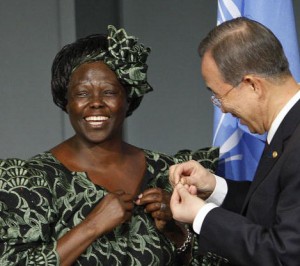
“It is evident that many wars are fought over resources which are now becoming increasingly scarce. If we conserved our resources better, fighting over them would not then occur…so, protecting the global environment is directly related to securing peace…those of us who understand the complex concept of the environment have the burden to act. We must not tire, we must not give up, we must persist.” —Wangari Maathai
In 2004, when Wangari Maathai was awarded the Nobel Peace Prize for her founding of the Green Belt Movement in Kenya, a debate was sparked. What did planting trees and empowering village women have to do with peace?
At the time, Rainforest Action Network (RAN) board member Anna Lappé and her mother Frances Moore Lappé wrote a spirited defense of the choice, that is well worth a read and contains a message just as beautifully relevant today. Part of the special genius of Wangari Maathai was in the connection she made between local solutions and global transformations. Put another way, Maathai showed how ecological collapse at the local level is at odds with peace on the global scale and how simple village women, sustaining their own piece of land, are every bit as important as UN negotiators or heads of state.